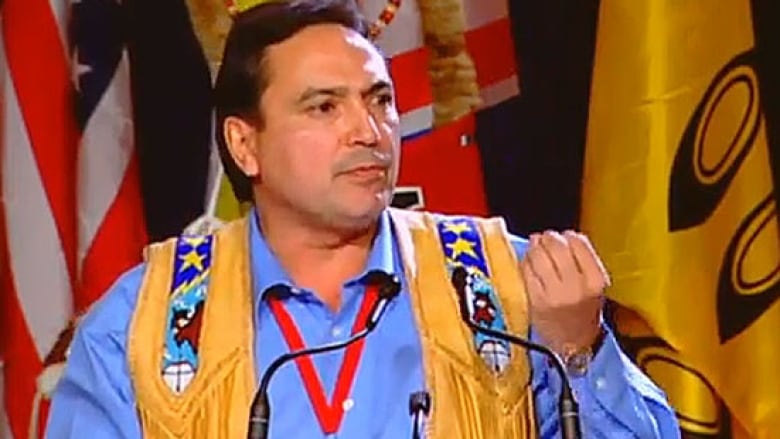Assembly of First Nations at a crossroads as Perry Bellegarde elected chief
Election of new AFN national chief does little to sway critics

The Assembly of First Nations has a new national chief.
Usually that's a big deal.
This time, for many, it's not.
"I don't believe electing a new national chief is going to change anything," says Lynn Acoose, chief of Sakimay First Nation in Saskatchewan.
In fact, Acoose, who is from the same province as newly elected National Chief Perry Bellegarde, didn't go to the election in Winnipeg, sending a band councillor who was keen to go as a proxy instead. She says she just didn't see the point.
In 2012 there was a diverse slate of eight candidates, four men and four women. This time it was a slate of only three. All men, whom many consider to be of the "old guard." Bellegarde and Ghislain Picard are regional chiefs already on the AFN executive. The third, Leon Jourdain, is a former Treaty 3 grand chief.
"I believe the AFN has to reinvent itself to be more responsive to people, to the grassroots, to women, to other people who want greater participation in shaping the future," says Acoose. But she isn't alone in thinking that's not going to happen in a hurry.
AFN relevancy increasingly questioned
The voices who argue the AFN is irrelevant are growing in number. They say it is so entrenched in being an organization run by chiefs for chiefs that it has lost its way. It has lost the ear of its people. And as an organization divided, it has also lost the ear of the federal government.
While many First Nations finger the Conservative government for not truly coming to the table, they also blame the AFN for being an ineffective lobbyist. The results speak for themselves: multiple pieces of legislation they oppose and perpetual court battles against Ottawa and no inquiry into missing and murdered aboriginal women.
But Nova Scotia Regional Chief Morley Googoo argues that for an organization thrown into turmoil by the sudden and unprecedented resignation of Shawn Atleo as national chief in May, it's good to simply have settled the question of leadership for now.
"It's like we're pressing the reset and restart button for the AFN," he says. "It's a work in progress."
'People will give Perry a chance'
One observer points out that while the AFN is not a political party, there are analogies to be made. Sometimes parties go through a wilderness period during which critics and naysayers warn of their imminent demise.
Then, if they are smart, they merge or change into something else and rebuild. Or they are lucky and, out of the mist, a leader emerges — one who is inspirational, charismatic and capable of uniting the factions.
But even those who like and support Bellegarde don't describe him as that kind of leader.
Still, P.E.I. and New Brunswick Regional Chief Roger Augustine insists Bellegarde should not be counted out or underestimated.
"I think people will give Perry a chance," Augustine says. "He has 3½ years to make a difference."
And while people like Acoose opted out of the election, hundreds of chiefs and proxies did show up — 464 out of 633 to be exact. Bellegarde won on the first ballot with 291 votes, garnering a clear mandate for those who have not given up on the AFN.
Acoose wishes Bellegarde luck.
"But if we invest all of our expectations in one person, we're going to fail," she says.